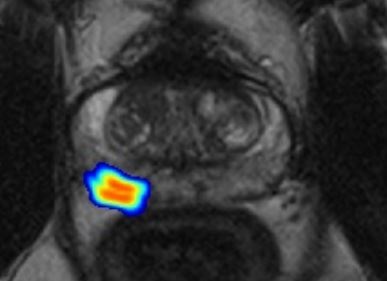Deep Learning-Based AI for Prostate MRI Helps Improve Risk Assessment and Avoid Unnecessary Biopsies
Posted on 20 Aug 2024
When a prostate-specific antigen (PSA) test indicates elevated levels, it might suggest the presence of prostate cancer, prompting doctors to recommend a magnetic resonance imaging (MRI) scan for further evaluation. Yet, a definitive diagnosis requires a prostate biopsy, which is invasive and can sometimes lead to complications like infections or bleeding, occasionally necessitating hospitalization. It is crucial to determine when a biopsy is essential for men with raised PSA levels to confirm or dismiss the suspicion of prostate cancer. Currently, clinicians use a risk calculator that incorporates various factors such as PSA levels, age, prostate volume, and MRI results to assess cancer risk. MRI evaluations are systematically rated using a system called PI-RADS, which helps estimate the likelihood of prostate cancer. Now, a new study indicates that combining risk markers, systematic MRI evaluations, and artificial intelligence (AI) can enhance prostate cancer risk prediction, potentially making biopsies unnecessary for men at low risk.
The retrospective study conducted by scientists from the German Cancer Research Center (DKFZ, Heidelberg, Germany) along with colleagues aimed to find out whether an AI based on deep learning could further improve or even replace the PI-RADS predictions. The team used "multiparametric MRI" which combines various imaging techniques and therefore provides very detailed images. The study included data from 1627 men who underwent multiparametric MRI scans of the prostate from 2014 to 2021 and subsequently had biopsies. An AI algorithm developed at DKFZ was trained with MRI images from over 1,000 of these men. With the remaining approximately 500 data sets, the researchers evaluated whether integrating their risk calculator with AI could better predict prostate cancer.

Replacing the PI-RADS values in the risk calculator with the AI approach showed little change in diagnostic significance. However, combining AI with PI-RADS yielded significantly improved outcomes, identifying 49% of the men who underwent biopsies as minimal risk. This suggests that nearly half of these biopsies could have been avoided using the combined approach without missing a significant number of tumors. The findings indicate that AI based on deep learning and PI-RADS evaluations by experienced radiologists provide complementary diagnostic information, leading to more precise risk stratification for patients.
"For patients with an elevated PSA value, it could be a great advantage in the future to integrate AI analysis into further diagnostics. However, prospective studies must confirm the benefits of the procedure and clarify that it has no disadvantages for patients," said David Bonekamp, a radiologist at the DKFZ.
Related Links:
DKFZ














